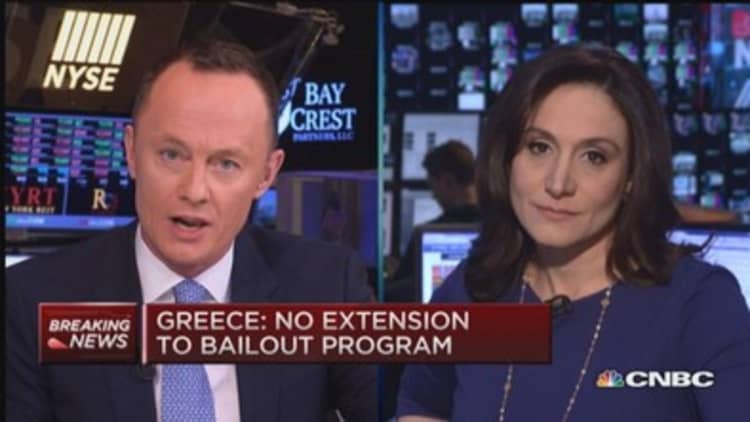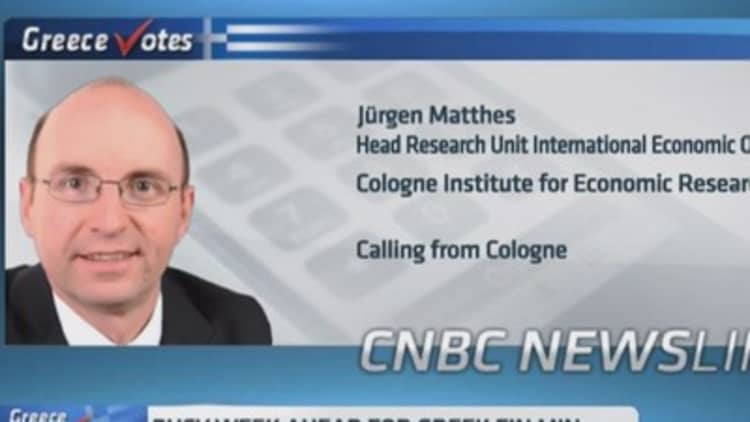Euro zone officials are increasingly worried that Greece's brinkmanship over its bailout will plunge the country into financial chaos after its finance minister said on Sunday that it would take up to four months to agree a "new contract" with creditors.
Yanis Varoufakis, Greece's newly appointed finance minister, said Athens would reject any further loans under its international rescue plan, despite Greece's €172bn bailout expiring at the end of the month. He also said he expected the European Central Bank to prop up the country's weakened banking system until a longer-term settlement could be reached.
Mr Varoufakis said Greece had been living for the next loan tranche for the past five years. "We have resembled drug addicts craving the next dose. What this government is all about is ending the addiction," he said, noting it was time to go "cold turkey".
His comments on Sunday underscored the fears of euro zone officials that the Greek government was unaware of the precariousness of its financial situation.
"Everybody [in the euro zone] wants a deal," said one senior euro zone official. "But through their actions and their rhetoric, the new government is making a lot of people upset. They are putting themselves in an impossible situation."

Mr Varoufakis was speaking in Paris on the first leg of a European tour intended to garner support for a renegotiation of its debt burden. Greece's anti-austerity government roiled markets during a tumultuous first week in power with 40 per cent being wiped off the value of Greek banks following announcements to reverse spending cuts and privatizations.
Despite a more emollient tone from Alexis Tsipras, Greece's radical left-wing prime minister, over the weekend, EU officials have been dismayed by Athens' repeated rejection of a bailout extension — and refusal to co-operate with the troika of international creditors. German officials were also irritated at its refusal to engage with Berlin, although Mr Varoufakis said he had now been invited to the German capital.
The finance chief said Athens would make proposals within a month for a "new contract" with the euro zone, which would be in place by the end of May. "We are not going to ask for any loans during this period. It is perfectly possible to establish liquidity provisions with the ECB."
Read MoreNobel winner: Germany's the problem, not Greece
However, it is unclear whether the ECB will agree to support Greek lenders under such conditions.
Officials familiar with the conversations between euro zone policy makers and Athens said they had little idea of the sort of international financial help Greece was seeking or how it intended to negotiate. Euro zone finance ministers want to discuss Greece's needs at their next meeting on February 16 — if not sooner, by telephone.
Michel Sapin, French finance minister, urged Athens to come forward with its plans "calmly and quickly".

The bailout program is due to expire on February 28. If it is not renewed, Greece will for the first time in five years be left without an EU financial backstop. Because the International Monetary Fund is unlikely to distribute funds without the EU's participation, Athens could lack access to emergency funding to repay billions of euros in debt due in the coming months.
EU officials believe the country could eke out €4.3 billion in payments owed to the IMF next month, but will run into a wall at the beginning of June when the first of two bonds worth more than €3 billion must be paid. Without bailout funding, and an ongoing sell-off in the private bond markets, Athens would be forced to default.
More from the Financial Times
Grexit is an avoidable catastrophe for the eurozone
Bill Gross says European QE is 'too little, too late'
Barack Obama plans to tax overseas cash piles
Of more concern to many officials is the Greek banking system, which after massive outflows of deposits is relying on cheap ECB loans to fund day-to-day operations. ECB officials over the weekend made it clear that if the program expires at the end of February, the central bank would be forced to cut off their liquidity loans.
But they have not clarified whether Greek banks could still access back-up central bank financing, known as emergency liquidity assistance. Although technically loaned by the Greek central bank, it must be approved by the ECB, which has been cagey on whether such lending would be allowed.
Since the outbreak of the euro zone crisis, Greece's banking system has always been seen as the most likely route to an "accidental" Greek exit from the euro. Without ELA lending, Athens would probably have to print its own currency to keep its banking system running.
ECB president Mario Draghi has told colleagues he is planning to drive a hard bargain on bank liquidity — a similar strategy used with Cyprus in March 2013, which forced Nicosia to accept onerous bailout terms. But Mr Draghi is also wary of unelected central bankers taking a decision that would force Greece from the euro.

